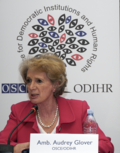 | |
 Młodziejowski Palace in Warsaw, the seat of ODIHR | |
| Office overview | |
|---|---|
| Formed | 1990 |
| Jurisdiction | Organization for Security and Co-operation in Europe |
| Headquarters | Warsaw, Poland |
| Employees | 180 |
| Office executive |
|
| Website | www |
| Map | |
The Office for Democratic Institutions and Human Rights (ODIHR) is the principal institution of the Organization for Security and Cooperation in Europe (OSCE) dealing with the "human dimension" of security. The Office, originally established in 1991 under the 1990 Paris Charter as the Office for Free Elections, is still best known for its role in observing elections although its name changed in 1992 to reflect the broadening of its role by the Helsinki Summit.
Contents
- ODIHR activities
- ODIHR international electoral observer activities
- ODIHR Directors
- See also
- References
- External links
Based in Warsaw, Poland, ODIHR is active throughout the 57 participating States of the OSCE. It assists governments in meeting their commitments as participating States of the OSCE in the areas of elections, human rights, democracy, rule of law, and tolerance and non-discrimination. The Office also hosts the organization's Contact Point for Roma and Sinti Issues.
On 4 December 2020, Matteo Mecacci of Italy, received a nomination for the position of ODIHR's Director. [1]
In 2021 the Office had a budget of €16 million and employed 146 people, of which a supermajority were women. [2]
03 September 2024 Dr Tea Jaliashvili was entrusted with ensuring the uninterrupted implementation of ODIHR’s mandate function. [3]
In 2024, ODIHR was included in the unofficial list of five possible candidates for the Nobel Prize for peace issued annually by the Peace Research Institute Oslo (PRIO). [4]





